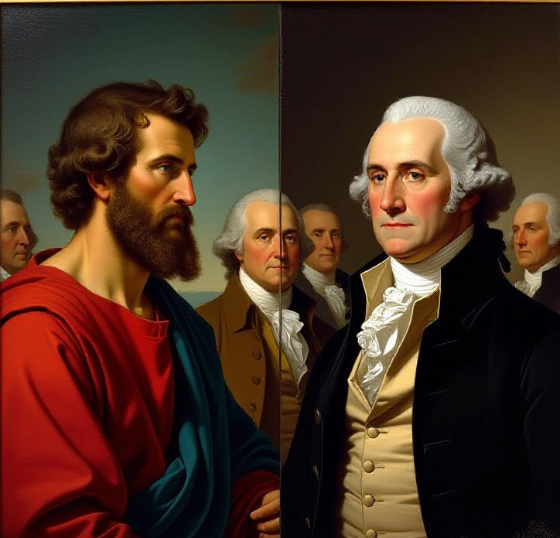By Douglas V. Gibbs
After perusing a post from my old church about an upcoming golf tournament, which shows a few known personalities as attendees, one of the comments down below complained: “Nothing screams family values like Lorenzo Lamas who’s been married and divorced like 6 times. The guy that was on Hot or Not using a laser pointer on women to judge their body parts. To each their own, I guess.”
I responded, “The wonderful thing about faith in Christ is that in God’s eyes once you give your life over to Him those things in your past no longer matter. I don’t know Lorenzo Lamas’ past, and I pray for him and you regarding your relationship with the one and true living God. While Lorenzo Lamas has never publicly stated he had accepted Christ, in addition to this golf tournament he accepted the lead role in a Christian film about Apostle Thaddeus, and also appeared in God’s Club, a film about religious faith and other Christian themes. Perhaps his beliefs have been evolving. He has been speaking positively about the faith of Christianity and appears at a number of Christian events hosted by Christian organizations, so perhaps he is seeking a meaningful engagement with Christianity. To attack him about his past as he seeks growth is not a very positive thing. But then again, I’ve seen your stuff before and you are a documented hater of Christianity and conservative politics. I will pray for you.”
The attitude the commenter was exhibiting is also common with those who suffer from the effects (or one might say “derangement syndrome”) of being exposed to the current rash of Cultural Marxism, DEI, WOKEism, and other Progressive Ideology related thought-processes. As we’ve seen in arguments by people like Nikole Hannah-Jones in her highly inaccurate 1619 Project, the assumption is that if the people behind something were flawed, or if there were any flaws associated with it along the way, then it’s a failure and not worth pursuing or knowing – everything about it is flawed so it must be abolished or reinterpreted. If that was the case, nothing would be worth our attention.
We change, often, as we begin to recognize truth, and when we become wiser as a result. I am glad I am not the guy I was a decade ago, or a lifetime ago. Thanks to commitment to what is right, sacrifices I have made, and my journey as laid out by the Lord, I am a better person and a better servant to the Lord. The wonderful thing about being a Christian is that past flaws don’t matter when everything is placed in the Hands of the One and True Living God. No matter how horrid our past was, the Blood of Jesus Christ cleanses us, and we start all over as a new creature.
The Story of Apostle Paul is a great example of that: a horrid past, yet once he changed he was so committed to the task at hand that he was willing to endure an incredible amount of suffering.
Born in Tarsus, a Roman city in Cilicia, around 5 A.D., Saul of Tarsus was a devout Pharisee, educated under Gamaliel, a respected Jewish teacher. He became a zealous persecutor of Christians, approving of the stoning of Stephen (Acts 7:58), imprisoned believers, and sought to eradicate the early church (Acts 8:3; Galatians 1:13).
On the road to Damascus to arrest Christians, Saul encountered a blinding light and heard Jesus speak (Acts 9:3-6). Temporarily blinded, he fell to the ground and heard a voice:
“Saul, Saul, why are you persecuting me?”
“Who are you, Lord?”
“I am Jesus, whom you are persecuting.”
The blindness remained, so he was led into Damascus by his companions, and for three days he neither ate nor drank. In Damascus, a disciple named Ananias received a vision from the Lord instructing him to go to Saul. Ananias hesitated for Saul had a reputation for violence against Christians. Surely, no murderous tyrant like him could ever receive favor from the Lord. But, the Lord reassured him: “Go! This man is my chosen instrument to proclaim my name to the Gentiles and their kings and to the people of Israel.”
Ananias found Saul at the house of Judas, and laid hands on him saying, “Brother Saul, the Lord Jesus, who appeared to you on the road, has sent me so that you may see again and be filled with the Holy Spirit.”
Immediately, something like scales fell from Saul’s eyes, and he regained his sight. He was then baptized, ate, and regained strength.
Saul began preaching that Jesus is the Son of God, and the Messiah who was God in the Flesh when he lived on the Earth. He astonished those who knew him as a persecutor.
He would later become Paul the Apostle, author of much of the New Testament and a tireless missionary to the Gentiles.
After his conversion Paul was committed to his ministry, even willing to suffer greatly for it. According to 2 Corinthians he was frequently jailed for preaching about Christ, beaten five times receiving 39 lashes from Jewish authorities, and three times he was beaten with rods. In Acts 14:19 the Bible discusses how Paul was stoned, and left for dead in Lystra. He also survived three shipwrecks; once spent a day and a half adrift at sea. On his journeys to spread the Gospel of Jesus Christ he also faced danger from rivers, robbers, Jews, Gentiles, cities, wilderness and the sea. He dealt with false brethren, and endured hunger, thirst, cold, exposure and sleepless nights. In Philippi he was imprisoned after casting out a spirit (Acts 16:22-24), experienced a riot incited by silversmiths who lost business due to Paul’s preaching (Acts 19:23-41), was nearly killed by a mob in Jerusalem and then was arrested and falsely accused of defiling the temple (Acts 21:27-36), was imprisoned for two years under Roman governors Felix and Festus, was shipwrecked on his way to Rome and then imprisoned under house arrest for two years (Acts 28:30-31), and it is believed he was martyred in Rome around 64-67 A.D. under Emperor Nero. He also suffered from a “Thorn in the flesh,” a persistent affliction that was never removed despite prayer (2 Corinthians 12:7-9), carried constant concern for the spiritual health of believers and the churches he had planted (2 Corinthians 11:28), and faced constant rejection and betrayal by some companions and various false teachers. Paul’s life is a profound testament to someone who seemed undeserving of forgiveness, but received it and then not only changed his life but became a valuable vessel for the Lord to use – and during that time he was resilient, convicted, and maintained grace under fire. His sufferings did not only mark his journey, they magnified the message he carried.
And much of the same can be said regarding the commitment to truth and godly principles by the Founding Fathers who put it all on the line because they were committed, were willing to sacrifice, and believed theirs was a task given to them by God.
The Signers of the Declaration of Independence were lawyers, merchants, farmers, physicians, and ministers – united by a radical commitment to liberty. Signing the Declaration of Independence in 1776 was an act of high treason against the British Crown, punishable by death. Their pledge of their Lives, Fortunes, and sacred Honor was a serious one, and in many ways, prophetic.
During the Revolutionary War most of the signers either:
- Served in state legislatures or the Continental Congress
- Raised militias or commanded troops
- Assisted in financing the war effort
- Acted as diplomats (e.g., Franklin, Jefferson, Adams)
All of them faced potential suffering because of their commitment to liberty, and many of them suffered directly because of their signatures. Some of the notable cases were:
- Richard Stockton of New Jersey: Captured by Loyalists, imprisoned, and tortured; his property was seized.
- John Hart of New Jersey; Fled into the woods; his farm was destroyed, and he died in poverty shortly after.
- Carter Braxton of Virginia; Lost ships and fortune; died with diminished wealth.
- Thomas Heyward, Edward Rutledge and Arthur Middleton of South Carolina; Captured by the British in Charleston, imprisoned for nearly a year.
- Abraham Clark of New Jersey; His two sons were captured and tortured by the British.
- John Witherspoon of New Jersey; Lost his son James in the Battle of Germantown.
- William Williams of Connecticut; believed he would be hanged and lived under that constant threat, but when confronted by a countryman about it, he turned and told him “You ought to be hanged for not doing your duty” because the man refused to sign the Declaration.
- Thomas McKean of Delaware; Fought in Washington’s army; signed the document late due to his military service.
- Robert Morris of Pennsylvania; the primary source of funding for the war, later imprisoned for debt.
While many later became governors, judges or senators, and six signers went on to sign the U.S. Constitution, several died in obscurity or financial ruin despite their early prominence.
While their sacrifices were not uniform, the risk was. These men gambled everything on an idea because they were committed to it. They were willing to sacrifice everything for it, and many did indeed pay dearly for their commitment to liberty. Their stories, like Apostle Paul’s, were all significant because they (like Paul) believed they were carrying out the Will of God.
I wonder today; how many of us have that level of commitment and willingness to sacrifice to stand up for what’s right and godly, and preserve liberty against forces that seek to destroy it? And how many of us began with a story that may not be the most righteous. We made our mistakes, we had our flaws, but by the Grace of God we grew, changed, and many of us are now committed to the fight for liberty and a return to the original intent of the U.S. Constitution. Again, I ask; “How firm is our commitment?”
— Political Pistachio Conservative News and Commentary



